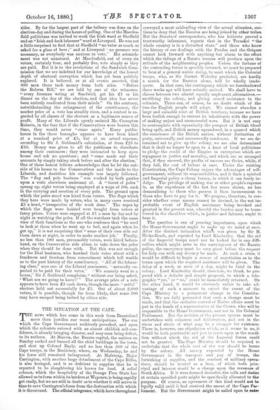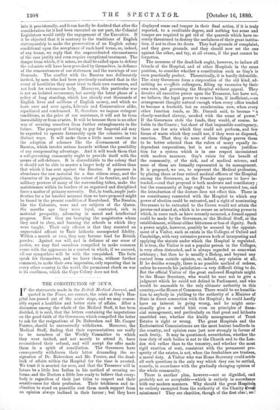THE SITUATION AT THE CAPE. T HE news which has COMO
in this week from Basutoland more than justifies our worst anticipations. The war which the Cape Government recklessly provoked, and upon which the colonists entered with an almost childish self-con- fidence, is already bringing disaster, and may soon bring defeat, to its authors. At Maseru, the Basuto capital, the natives on Sunday sacked and burned all the chief buildings in the town, and shut up Colonel Bayly, and no less than 500 of the Cape troops, in the Residency, where, on Wednesday, he and his force still remained beleaguered. At Mafeteng, Major Carrington, with another large detachment of the Cape Rifles, is also besieged, and is so deficient in supplies that he is reported to be slaughtering his horses for food. A relief column, which the hospitality of the Orange Free State has allowed us to form within its borders at Wapener, is being rapidly got ready, but we are still in doubt as to whether it will arrive in time to save Carrington's force from the destruction with which it is threatened. The official telegrams, which have throughout conveyed a most misleading view of the actual situation, con- tinue to deny that the Basutos are being joined by other tribes.
But the Standard correspondent, who has hitherto proved a trustworthy informant, reports that in the Transkei " the whole country is in a disturbed state," and those who know the history of our dealings with the Pondos and the Griquas cannot look forward with anything but alarm to the effect which the tidings of a Basuto success will produce upon the attitude of the neighbouring peoples. Unless the fortune of the contending forces is speedily reversed, we must be prepared to hear of a general native rising, to meet which the Colonial troops, who, as Sir Garnet Wolseley predicted, are hardly a match for the Basutos alone, will be wholly inade- quate. In that case, the contingency which we foreshadowed three weeks ago will have actually arrived. We shall have to choose between two almost equally unpleasant alternatives,— sacrificing the colony, and giving armed assistance to the colonists. There can, of course, be no doubt which of the two the English people will adopt. We cannot abandon a large and valuable tract of British territory, because we have been foolish enough to entrust its inhabitants with the power of making unjust and unsuccessful wars. But it is not easy to contemplate with equanimity the prospect of British blood being spilt, and British money squandered, in a quarrel which the conscience of the British nation, without distinction of party, universally and unreservedly condemns. If we are de- termined not to give up the colony, we are also determined that it shall no longer be open to a knot of local politicians to pledge the credit of the Empire in enterprises which are repugnant to justice and morality, and which are so arranged that, if they succeed, the profits of success are theirs, while, if they fail, the cost of failure is ours. Under the existing Constitution, the Cape Colony enjoys the advantages of self- government, without its responsibilities, and it finds a spirited and Imperial policy a cheap luxury, in which it can freely in- dulge. The privilege of making war at other people's expense is, as the experience of the last few years shows, no less demoralising to those who possess it than inconvenient to those who have to pay for it. Wo propose, therefore, to con- sider whether some means cannot be devised, in the not im- probable event of English assistance being invoked and granted in the present war, whereby the burden may be trans- ferred to the shoulders which, in justice and fairness, ought to bear it.
The question is one of pressing importance, upon which the Home Government ought to make up its mind at once. After the distinct intimation whiCh was given by Sir M. Hicks-Beach, and repeated by Lord Kimberley, that the aid of the Imperial troops must not be looked for in any diffi- culties which might arise in the carrying-out of the Basuto policy, the emergency must be very great before the request for help can with any decency be made. At such a crisis, it would be difficult to begin a course of negotiation as to the terms upon which the required assistance will be given. The delay of a week, or even of a day, might be fatal to the colony. Lord Kimberley should, therefore, we think, be pre- pared with a definite and simple proposal, to which a tele-
graphic "yes," or " no," could be immediately returned. On the other hand, it would be obviously unfair to take ad- vantage of such a moment to extort the assent of the Cape Ministry to a permanent change in the Constitu- tion. We are fully persuaded that such a change must be made, and that the exclusive control of Native affairs must be put in the hands of a representative of the Crown, who will be responsible to the Home Government, and not to the Colonial Parliament. But the revision of the present system must be undertaken with calmness and deliberation, and not in the stress and strain of what may be a struggle for existence.
There is, however, one stipulation which, as it seems to us, it
would be both practicable and just to insist upon as the condi- tion without which the aid of the Imperial forces could not be granted. The Cape Ministry should be required to
undertake that the whole cost of the war should be borne by the colony. All money expended by the Home
Government in the transport and pay of troops, the
furnishing of supplies, and the conduct of military opera- tions, should be treated as a loan, of which both prin- cipal and interest would be a charge upon the revenues of South Africa. If it were deemed desirable, the tolls and duties at certain specified ports might be specifically allocated to the purpose. Of course, an agreement of this kind would not be legally valid until it had received the assent of the Cape Par- liament. But the Government might be called upon to enter into it provisionally, and it can hardly be doubted that after the consideration for it had been executed on our part, the Colonial Legislature would ratify the engagement of the Executive. If it be objected that it is contrary to the traditions of English statesmanship to make the preservation of an English colony conditional upon the acceptance of such hard terms, or, indeed, of any terms, we reply that the unprecedented circumstances of the case justify and even require exceptional treatment. The danger from which, if it arises, we shall be called upon to deliver the colonists will have been provoked by themselves, in defiance of the remonstrances of our statesmen and the warnings of our Generals. The conflict with the Basutos was deliberately invited, by men who had been previously cautioned that in the event of hostilities they must trust to their own resources, and not look for extraneous help. Moreover, this particular war is not an isolated occurrence, but merely the latest phase of a policy of long standing, which has already cost thousands of English lives and millions of English money, and which we have over and over again, Liberals and Conservatives alike, repudiated and condemned. If, therefore, we impose stringent conditions, as the price of our assistance, it will not be from insensibility or from avarice. It will be because there is no other way of securing ourselves from further entanglements in the future. The prospect of having to pay for Imperial aid may be expected to operate favourably upon the colonists in two distinct ways. It will make them a little more cautious in the adoption of schemes like the disarmament of the Basutos, which involve serious hazards without the possibility of any compensating advantage. And it will teach them that a self-governing community ought to provide itself with the means of self-defence. It is discreditable to the colony that it should not be able to muster a larger body of soldiers than that which it has sent against the Basutos. It possesses in abundance the raw material for a fine citizen army, and the character of its population, the extent of its frontier, and the military prowess of many of the surrounding tribes, make the maintenance within its borders of an organised and disciplined force a matter of primary necessity. But, in truth, ample justi- fication for a far harsher measure than we have proposed might be found in the present condition of Basutoland. The Basutos, like the Colonists, were and are subjects of the Queen. Six months ago they were loyal, contented, rich in material prosperity, advancing in moral and intellectual progress. Now they are besieging the magistrates whom they used to obey, and burning the schools in which they were taught. Their only offence is that they resented an unprovoked affront to their hitherto unsuspected fidelity. Within a month or two, they may become food for British powder. Against our will, and in defiance of our sense of justice, we may find ourselves compelled to make common cause with the aggressors in a contest in which, if we succeed, all our sympathies will be with the vanquished. The facts speak for themselves, and we leave them, without further comment, to make their own impression, only repeating that in every other country in the world, the permanent check on war is its costliness, which the Cape Colony does not feel.



































 Previous page
Previous page